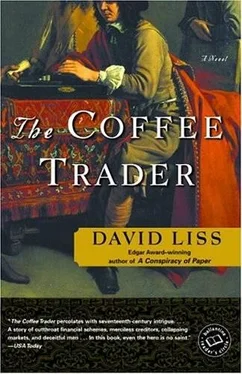“I can only hope that you will,” Desinea told him sternly. “You are a grown man, Senhor Lienzo, not a boy whose transgressions can be overlooked.”
Desinea’s words stung furiously, but Miguel knew his pride would recover. The tide had begun to recede, after all. The Ma’amad had made its point. He had been warned.
“I wonder if that is enough.” Solomon Parido leaned forward as though scrutinizing something on Miguel’s face. Though animated by his expectation of triumph, he appeared, if anything, more morose than ever. Even the taste of victory brought him no joy. “Such warnings can be effective, I grant you, but I am not convinced they will suffice in this case. I am a friend of Senhor Lienzo’s family, so I speak with genuine concern when I say he has been issued many warnings in the past. Now we must ask, Have they led him to change his ways? Have they ever inspired in his heart a new love of the Law? Forgiveness is a blessing in the eyes of the Most High, but we must not forgive too easily or too often without damaging the community.”
Miguel swallowed hard. Perhaps, he thought, Parido only meant to appear harsh that he might better disguise his true intentions of protecting Miguel. Why would he have pretended friendship this past month only now to turn on him? If he sought to impose the cherem, why had he not made use of his knowledge that Miguel had bribed a servant girl into fingering Parido as the father of her child? None of it made sense.
“We cannot know how those warnings have shaped the senhor,” ben Yerushalieem commented. “Is it therefore not pure speculation to say that warnings have had no effect? We may have changed Senhor Lienzo’s behavior greatly and rescued him from his own worst self.”
“Senhors, I must commend your generosity, but I wonder if generosity may not do our community more harm than good.”
Miguel felt himself wobble in the chair. This was no mere pretense at harshness. Parido was after blood.
“Really, senhor,” ben Yerushalieem said, “this denunciation is unbecoming. You and Senhor Lienzo have had disagreements, but Holy Torah commands us not to hold a grudge.”
“This is no matter of grudges. All Amsterdam knows that I’ve set aside our former differences, but that does not mean that I must hold my tongue when I see evil. I have it on good authority,” Parido pressed on, “that this man is engaged in a matter of business that presents a direct threat to this community.”
So this is his move, Miguel thought, as he tried to keep his face from twitching. He could not yet see the whole of the plan, but he recognized the pieces. The gestures of friendship now allowed Parido to claim only the best motives.
“Is this true?” Desinea asked.
“By no means,” Miguel managed to answer, though his mouth had grown painfully dry. “Senhor Parido might wish to reexamine his source of information.”
“Can you tell us more, Senhor Parido?” ben Yerushalieem asked.
“I believe it is Lienzo who must tell us more.”
“ Senhor Lienzo,” Miguel corrected.
“The members of this council need no lessons in etiquette,” Parido explained softly. “You are here to answer our questions.”
“Senhor Parido is right,” another parnass, Gideon Carvoeiro, announced. “True, these two men have had words, but that means nothing. The senhor has set forth a question. We cannot bring a man before us and allow him to choose which questions are to his liking.”
Parido made a halfhearted effort to hide a smile. “Precisely. You must tell us the nature of your new venture.”
And there it was. Parido had sought Miguel’s friendship to learn about his plans in the coffee trade. When that had not worked, he had deftly use his position on the Ma’amad not to arrange Miguel’s excommunication but to use their old animosity as an excuse to discover the nature of his business. Now Parido surely thought that Miguel had no choice but to divulge his secrets-otherwise he would almost certainly face the cherem, for defiance of the council was among the most serious of crimes in its eyes. Parido had set his trap brilliantly: Miguel must give up his secrets or be destroyed.
But Miguel would not be so easily ruined; a Jew from Salonika could not hope to scheme like a former Converso. Miguel believed he might still teach Parido a few things about deviousness.
“Senhors,” he began, after taking a moment to formulate his reply, “I hope you will consider that a man of business is not always at liberty to answer questions concerning his affairs. I have agreements with other merchants who depend on my silence. I need not explain to you the role of rumor on the Exchange and the importance of keeping some dealings quiet.”
“Quiet is not a luxury you possess right now,” Parido said. “The Ma’amad’s need to protect the Nation must take precedence over your inclination toward secrecy.”
Miguel swallowed hard. He might ruin himself if he spoke with too much arrogance, but the right tone would win the day. “Then I must respectfully refuse to answer, senhors.”
Desinea leaned forward. “I must remind you that our Nation knows no greater crime than refusal to cooperate with the Ma’amad. Any business scheme upon which you have embarked, lawful or no, may prove itself difficult to execute if you earn the enmity of our Nation.”
“Senhors,” he repeated, careful to keep his tone modest and respectful, for everything hinged on their response to what he now said. “I beg you consider what it is you ask of me, whether answers must be pursued regardless of costs. There is no one in this room who does not have a relation or friend who was destroyed by the Inquisition in Portugal. This council has established itself in the hopes that our people may never have to face those horrors again, but I fear that in truly understanding our enemy we may have become too much like him.”
Ben Yerushalieem slammed his palm down on the table. “I advise you to think before you speak further.” Veins bulged out in his neck. “You dare liken this council to the Inquisition?”
“I only suggest that we must think about the cost of inquiry, and if the answers are worth the price of the asking.”
“Particularly if those costs are yours,” Parido quipped.
The council laughed, Parido’s comment having eased some of the tension, but Miguel clenched his teeth in frustration. “Yes,” he shot back. “Particularly if they are mine. This council is designed to protect the well-being of the Nation as a whole. It wants nothing so much as to see the Nation flourish. Yet that nation is composed of people. I believe it wrong that you ask one of those people to sacrifice his well-being to satisfy the vague curiosity of the community. Must I give up my chance of regaining some small portion of my fortune so that you may know I have done nothing wrong? Perhaps if there were specific charges; but to force me to reveal secrets that protect my business interests in order that you might learn if they may prove dangerous to the community-this is an injustice.”
No one spoke for a moment. Parido opened his mouth but understood that Miguel’s spirited outburst had changed the council’s tone. He could not push too hard here.
“I believe that Senhor Lienzo has argued an important point,” Desinea said at last. “We need not ask him to expose himself without just cause. Such a pursuit could send a chill throughout the city and discourage others of the Nation from seeking refuge here or embracing their ancestral faith. Moreover, if by speaking here the senhor does any damage to Dutch businessmen, the results could do us greater harm than we can endure.”
“What sort of Dutch businessmen?” Parido demanded. “That is what we must find out. We have already established his unappealing connections.”
Читать дальше












